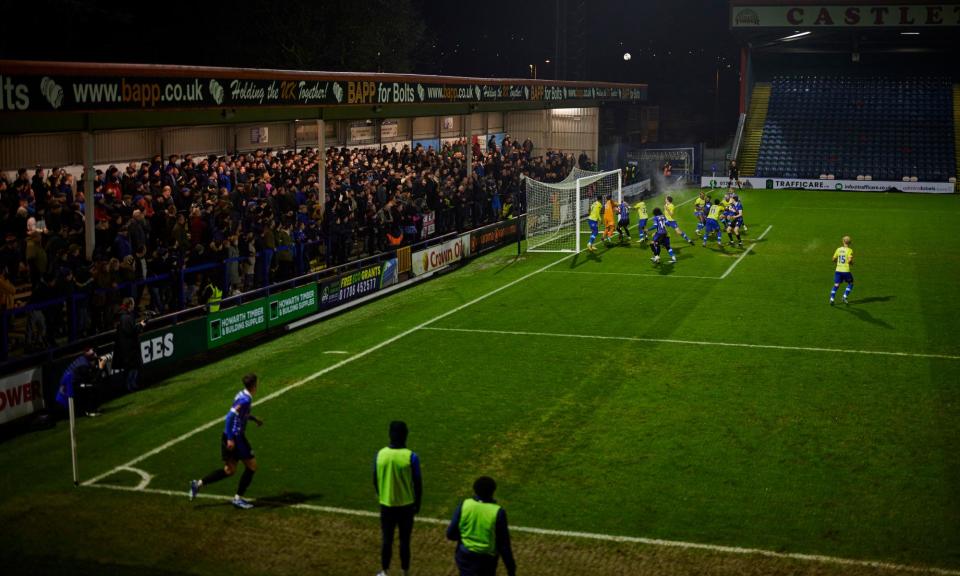‘It is bleak’: Rochdale fight to survive in shadow of Ratcliffe’s £1.3bn deal

“The existence of Rochdale AFC is at stake,” were the stark words of the club’s chairman, Simon Gauge. As with most things in life, the matter boils down to money. The Greater Manchester club require £2m of investment in the coming weeks or face the prospect of liquidation.
In the shadow of Sir Jim Ratcliffe’s £1.3bn purchase of little more than a quarter of Manchester United, the need for comparative pocket change up the road in Rochdale is a matter of life and death. The town, 14 miles north of Manchester, struggles for positive PR and to lose its one professional sports club would be a considerable blow.
A hearty 1,836, who had a week to digest the news, attended Tuesday’s 3-0 win over Wealdstone amid the cold and rain in the National League at Spotland. Thoughts briefly turned to matters on the pitch, providing normality amid a backdrop of worry. Mascot Desmond the Dragon did the rounds pre-match, a patient young fan grabbed a selfie with players as they jogged to warm up and friends met up in the stands for their fortnightly chat, debating whether the formation change would make a difference, in between talk of the drizzle and dipping temperatures.
“We were in the [Football] League for 102 years and now we’re out and really really down – it is bleak,” says John Leach, a fan for 61 years. “I first came with my father and grandfather, who were essentially functional mutes of the northern type of the day, very little to say until we came to the football. I have very fond memories of cementing a bond with my father and grandfather down the years. We used to travel to away games a lot. I have all of that and if the club goes, it is just going to be another memory wiped from my life.”
North-west football has suffered more than most in recent years. Bury and Macclesfield have gone out of business, each re-forming further down the pyramid. This is one of the reasons Gauge, and fellow supporters, took on the challenge of keeping Rochdale afloat in a fan-ownership model in 2021.
They needed to ward off a hostile takeover, taking up much time and energy. Members of the board wonder whether it has all been worth it for them personally because the situation in the background is draining, intensified by the effects of Covid and relegations. The cloth has been cut accordingly but outside money is the only way to keep The Dale going.
“It is not a financial investment, it is an emotional investment,” Gauge says. “In an ideal world, everyone – including myself – would like to stay on the fan-ownership model. The financial reality is that you have no one to fund the club when you need a cash input, so it doesn’t work. It is that realisation that people feel angry about, that you cannot operate a fan-led model. Everyone has the same motivation that they want the club to survive.”
Extensive efforts have been made over the past 15 months to attract the requisite investment. Finding interest has not been the issue but the directors were not convinced by certain offers and identified barriers to investment in the way the club is set up. They hope at an extraordinary general meeting next Thursday to get backing for changes that would enable 90% of the shares to be sold in a single £2m transaction.
Money running out before March’s salaries are due is a real fear. Rochdale sit 11th, six points above the relegation places. If the club is forced into administration, it could result in a 10-point deduction, putting them at greater risk of dropping into regional football – if they survive at all.
Selling academy graduates has helped keep the club afloat for a number of years. Despite the size of the club Rochdale have an enviable track record of selling on up the pyramid, regularly to Premier League and Championship clubs. There was hope the teenager George Nevett would be sold in January but talks stalled, amid interest from Crystal Palace and Southampton, as clubs tightened their belts. It is an indication of how small things can tip the balance.
Rochdale are an attractive investment for those with the funds; they own the ground and have very manageable levels of debt. The majority of interest is coming from America, partly thanks to the increased exposure in the English football pyramid provided by Ryan Reynolds and Rob McElhenney’s takeover at Wrexham. Not that the same can be expected at Spotland.
The mayor of Greater Manchester, Andy Burnham, has spoken with the club and is offering assistance in finding investment and spotlighting the value of getting involved in Rochdale. Burnham knows the importance of football clubs to a community and the loss of Rochdale would be a devastating blow to the town. The club runs a food bank, offers walking football and runs initiatives to get refugees and asylum seekers in the town playing football.
Rochdale are black and blue but there is plenty of fight left in the club. They may be down but they are not out.

